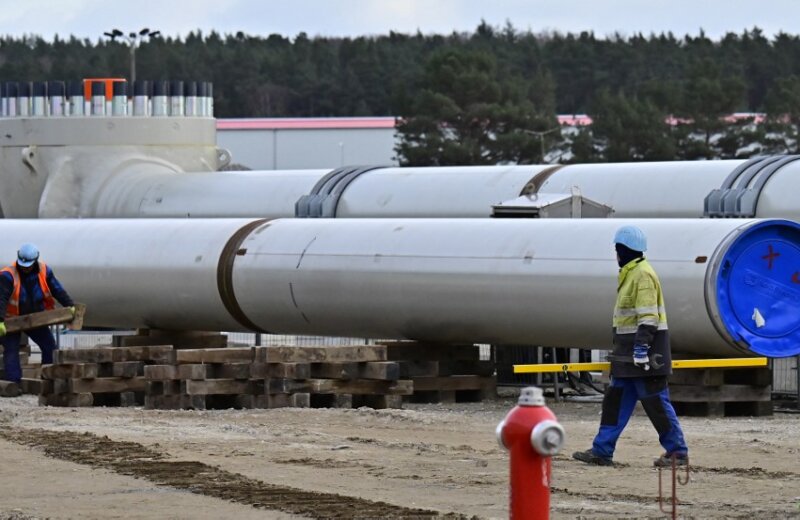Germany and the U.S. revealed a deal regarding Nord Stream 2, within which President Joe Biden refused to sanction the pipeline despite the will of the Congress and Germany commits to invest $175 million into a green energy fund for Ukraine as assurances of Ukrainian energy security. Such an “assurance” sounds like a joke considering that Ukraine will likely lose at least $ 1.5 billion annual profits from transporting gas to Europe through its pipeline.
Meanwhile, Nord Stream 2 is a prime example of violation of antitrust legislation. Ukraine and EU member states, which will bear losses because of the pipeline, have to act together to prove in relevant institutions and courts the fact of such a violation and force companies behind Nord Stream 2 to pay billions of dollars in fines. Good thing is that Poland and Ukraine are already working together on strategies opposing the pipeline. It is important for other EU member states to join and finally stop Nord Stream 2.
Damage from the pipeline
In June 2015, Nord Stream 2 AG, founded by Gazprom, concluded agreements to finance the Nord Stream 2 project with companies Engie, OMV AG, Shell, Uniper, and Wintershall Dea. Governments of Russia, France, Austria, and Finland are among shareholders of these companies.
As a result, in a few years the Ukrainian gas transportation system may be completely eliminated from the European market of natural gas transit. Traders who sell natural gas to consumers in Ukraine will also have limited access to our market. At the same time, Ukraine cannot provide itself with gas of its own extraction in the foreseeable future. There is a real prospect of the rise in gas prices for industry and the consumers.
However, since we are talking about concerted actions of foreign entities that could lead to anti-competitive effects on the territory of Ukraine, we believe that the parties to the agreements should obtain the appropriate permission of the Antimonopoly Committee of Ukraine (AMCU). Poland has already successfully used this approach.
Poland using antitrust tool against Nord Stream 2
In October 2020, Polish Office of Consumer Protection (UOKiK) fined Gazprom with 29 billion Polish zloty (6.5 billion euros). This is 10% of the annual turnover of the Russian company. Also more than 51 million euros in fines were imposed on Gazprom’s foreign partners for concluding agreements to finance the construction of the Nord Stream 2 gas pipeline without the permission of the Polish antitrust authority. Then, Gazprom was fined another 50 million euros for failing to provide information at the request of Polish antitrust authorities.
Back in 2016, the UOKiK banned the creation of a consortium for the construction of Nord Stream 2 as a joint venture because such a concentration could lead to restrictions of competition. In response, Gazprom and it’s five Western partners attempted to circumvent the need to obtain a permit. In 2017, Gazprom and French Engie Energy, German Uniper, Austrian OMV, Duthc-UK Shell, and German Wintershall signed agreements on financing the Nord Stream-2 project and the distribution of powers, while Gazprom remained the sole shareholder of Nord Stream 2 AG.
UOKiK reacted harshly to this maneuver. In April 2018, the agency filed charges against these companies, and in October 2020 issued a final decision with a staggering fine of more than 6.5 billion euros and demand to terminate the agreements concluded to finance the Nord Stream 2 gas pipeline.
The Polish Competition Authority has acknowledged that the launch of Nord Stream 2 could have serious consequences for the economy of Poland and the European Union. The high cost of the project can be offset with higher gas prices in the future. As a result, the implementation of the Nord Stream 2 project will affect not only competition in the market, but also average consumers.
Poles are also making it difficult for Russians to monopolize gas supplies. A few days ago, the European Court ruled in favor of Poland in a dispute over the capacity of the Opal gas pipeline (a land diversion of Nord Stream 2). Russia will now have to use only 50% of the pipeline’s capacity, not 100% as previously authorized by the European Commission. This means that the demand for gas, which is not delivered through Nord Stream, will be secured at least partially.
Ukraine can still join the fight
In the spring of 2021, the civic platform Antitrust League appealed to the AMCU to check the actions of the participants of the project Nord Stream 2 for violations of antitrust law of Ukraine. Unfortunately, the AMCU refused to consider the appeal and did not check any of the facts mentioned in it.
However, we believe that Ukraine must use all available legal instruments, both inside and outside the country to stop Nord Stream2, because this project is a threat to the national security of the entire Eastern European region. Therefore, we appealed to the AMCU once again asking to take into account the experience of the Polish Competition Authority. Ukrainian legislation provides AMCU with tools necessary to protect the economic interests of Ukraine, Ukrainian companies and consumers who may suffer from the Nord Stream-2 project.
We believe that all Ukrainian state officials, including the Minister of Foreign Affairs Dmytro Kuleba and President Volodymyr Zelensky, should now do everything possible to help the AMCU to finally start working in the interests of the Ukrainian people and fulfill its functions.
One thing is obvious now, even in the most difficult situations one needs to fight to the end and explore every possible solution. The example of Poland, which can be a partner of the AMCU in this direction, is illustrative.
Agiya Zagrebelska and Olena Pokanievych are experts of the Antitrust League, an educational civic platform.



